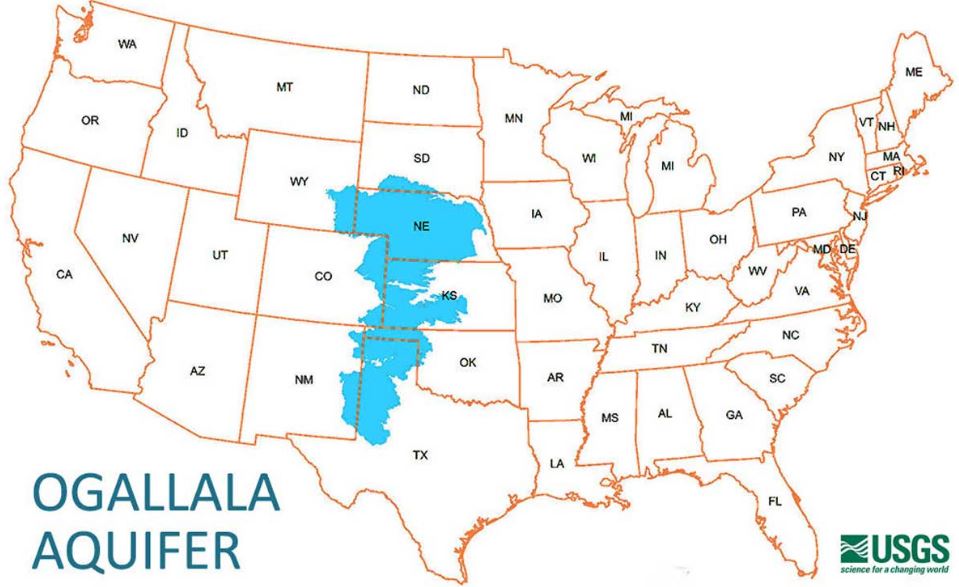From the Carlsbad Current-Argus
Many oil and gas operators and water producers in the Permian Basin region are adjusting their operations to conserve water from one of the country’s largest underground aquifers, six months after the New Mexico State Land Office demanded companies find another source of water.
The Ogallala aquifer extends as far north as Wyoming and South Dakota, with a small section of the freshwater shale reported in eastern New Mexico along the Texas state line.
The Ogallala, a freshwater source, has long been a source for agriculture in the American Midwest and for extraction activities in the Permian Basin.
But the massive water supply was found to have depleted in recent years, and State Land Commissioner Aubrey Dunn issued a directive in May aiming to curtail its use in favor of the nearby Capitan Reef aquifer which is brackish.
More than 70 percent of the Permian Basin’s wells are in “water-stressed areas,” while hydraulic fracturing needs were expected to double by 2020, read a 2014 study by environmentalist nonprofit Ceres.
In Dec. 8 news release, Dunn commended several companies for complying with his directive, even after a Local Hills water producer sued the Stand Land Office hoping for an injunction to the regulation. That case was still being litigated as of Dec. 5, court records show.
Water producer sues over limits on drilling into Ogallala Aquifer
“Using fresh drinking water for extracting oil is a thing of the past and I’m encouraged by the number of producers who are taking steps to be the solution, not the problem,” Dunn said.
Will Gray, Chief Executive Officer of Midland-based Remnant Oil Company LLC, an independent contractor, said his company is analyzing other sources of water aside from the Ogallala.
Remnant also intends to work with nearby oil and gas operators, read the release, hoping to purchase produced water at a reduced rate comparable to what companies pay for disposal.
“Not only will this collaboration benefit Remnant’s ability to offset any loss of water from the Ogallala, it will allow offset operators to recognize lower lifting costs which will ultimately result in more economic wells and an improved tax base for the State of New Mexico,” a press release from the State of New Mexico Commissioner of Public Lands said.
Under the new regulations, companies that draw from the Ogallala are required to submit additional hydraulic information along with applications for easements to use water from the aquifer for oil and gas related activities.
Those operations intended to draw from the Ogallala will be individually evaluated by the State Land Office, before or if they are permitted to draw up the water.
Gray said conserving the nation’s freshwater is a priority for the oil and gas industry, along with conservation efforts intended to reduce the industry’s impact on the environment.
“Water is a key component in our industry with many of the majors and large independents having led the way in innovation and conservation of this natural resource,” Gray said.
“The New Mexico oil and gas community will need to work together to better preserve these precious water resources going forward.”
Chevron relying on brackish water, recycled produced water for Permian
Oil and gas giant The Chevron Corporation also announced changes to its water usage aimed at protecting the Ogallala, while maintaining production using other, non-drinking-water sources.
The company “nearly eliminated” all of its use of freshwater for well completions, read a Friday statement from Chevron.
Instead, Chevron spokesman Cary Baird said Chevron’s Mid-Continent Business Unit, which operates in the Permian Basin, relies highly on low-quality brackish water, and recycled produced water — also lowering the amount of produced water that is disposed of once drilling is finished.
“Chevron recognizes the value of water as a fundamental social, environmental and economic resource,” Baird said. “As a global company, we know that access to adequate supplies of water, both freshwater and water of lower quality, is essential for the communities where we operate as well as for our ability to produce energy around the world.
“As users of this critical natural resource, we must manage it responsibly.”



